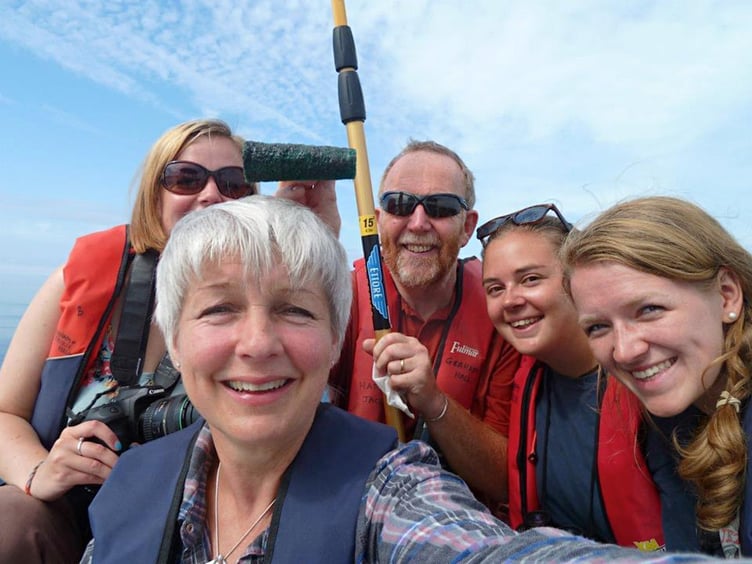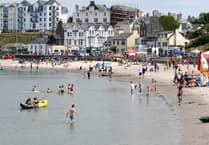With basking shark season well underway after the first sighting around the island on May 1, Manx Basking Shark Watch has announced it will be transferring responsibility for sightings to another charity.
Manx Whale and Dolphin Watch (MWDW) will take on public sighting reports from now on while the founders of Manx Basking Shark Watch (MBSW) opt for a well-earned retirement after having run the charity for over 18 years.
It has collected data since 2005, enabling scientists to evaluate fluctuations in the numbers of basking sharks seen in Manx waters.
Marine biologist Jackie Hall, who founded the charity along with her husband Graham, an engineer, said: ‘What we found for the first few years was that there were lots of sharks.
‘They arrive about now in May and are pretty much gone by mid-August.
‘The public loves it and that was really what MBSW was about at the beginning, it was getting people’s enthusiasm going, educating the public about basking sharks and how to behave around them and getting that invaluable data that the public could give us.
‘I’m just one scientist and there’s hundreds of eyes out there looking out, with people taking photos and videos – and there’s a lot of information in that.’
‘We’re absolutely delighted to be handing that data collection over to the MWDW.’
The public sighting scheme meant anyone that saw a basking shark could report it to the charity.
‘To start with we had telephone lines and paper forms to fill in and then if there were any queries we’d ring them back to ask any questions to ensure it was a basking shark,’ the 67-year-old said.
Another job the charity carried out involved the two founders and two other volunteers taking to the water in their boat, Happy Jack, to tag basking sharks.
Mrs Hall, from Port St Mary, added: ‘We were going out and taking basking shark passports so we could identify individual sharks by their gender, length, how their dorsal fin looked and if they were cooperative.
‘We’d sometimes put satellite tags on them to track where they went over the next year and took very tiny skin slime samples with a very long pole to send off to genetic studies, because we realised that we had sharks and they were relatively close to shore and easy to study.’
Over the past few years, shark numbers have been in steep decline around the Isle of Man.
‘We’ve got to be careful when we talk about basking shark populations because the public sighting scheme is collecting everybody’s reports of one shark and the number could get confused.
variation
‘But when you look at the overall numbers year by year there’s huge variation. In the last few years we’ve had very low numbers, and you start to wonder if it’s climate change, which is very likely because their prey are very temperature dependent.
‘What we were seeing in the middle years of studying them was that we were getting more at the beginning of the season before the water warmed up completely and I’m starting to get the impression that they were leaving earlier and moving north, through the tagging work and the numbers we’ve seen here.
‘Overall the impression was a sad one. We had very few sharks in the last few years and I was worried about what may be causing that, whether it’s man made disturbance or not, with what we’re doing in the seas.’
Tagging in the island will stop with the closure of the charity but scientists in Ireland will be taking on this responsibility.
The founder continued: ‘The Manx Lottery Trust had given us money to buy some satellite tags and because we had no sharks and we weren’t allowed on the boat due to Covid, we couldn’t get them on the sharks.
‘We sent them to scientists at the Queen’s University in Belfast and they put them on last week. Their sharks are our sharks, so we’ll be able to track them which is really nice because I was despairing at getting those on.
‘These are large migratory mobile animals, we have tracked them right up as far as the Pharaoh Islands, several times down to Morocco and we had one that went across the Atlantic towards America.
‘It’s really important that data collection carries on for hundreds of years or for as long as possible so I’m really pleased the MWDW have agreed to take over and continue with it.’
Mrs Hall’s favourite memory of the last 18 years has been when she saw a basking shark breach right next to their boat.
‘We were off the Calf of Man in our boat and there wasn’t a sign of a basking shark anywhere.
‘There were these puffins on the water and we all looked admiringly at them when quite suddenly a six metre long basking shark jumped out of the water far too close to the boat for my comfort and disappeared again.
‘Our faces must have been an absolute picture!’
You can now report any basking shark sightings around the island to the MWDW website.

.png?width=209&height=140&crop=209:145,smart&quality=75)



Comments
This article has no comments yet. Be the first to leave a comment.